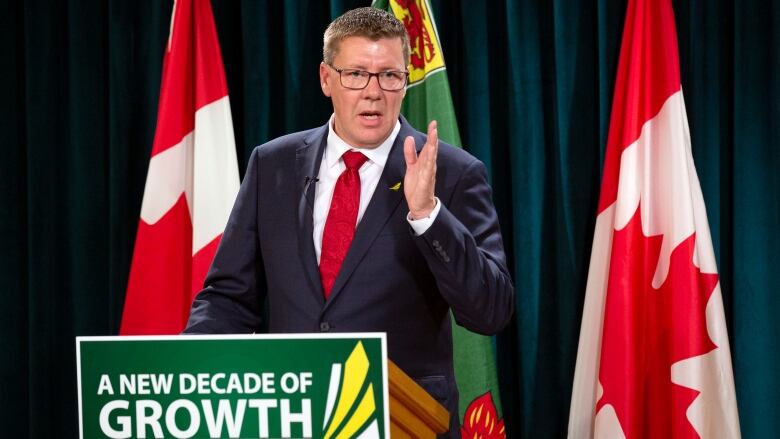COVID-19 in Sask: Plan to gradually 'reopen' province could come next week if cases stay low, premier says
2 cases of novel coronavirus reported Monday

Click here for the latest:COVID-19 in Sask: Daily temperature checks coming for all health care workers
- Premier Scott Moe said Monday that ifcase numbers remain low next week, the province might release a plan to "reopen segments of the economy"in tandem withramped-up testing and contact tracing. The province's top public health doctor is being consulted.
- There are now 300 cases of COVID-19 in Saskatchewan, including 178 people who have recovered from the virus.
- Only two new cases were announced Monday, the lowest daily increase in nearly a month.
- 27 cases are instances of local transmission not tied to a large gathering.
- The family of the fourth and youngest Saskatchewan resident to die of COVID-19 complications believes his was a case of community transmission.
- The trial of two men accused of breaking and entering is scheduled to proceed in person in Saskatoonamidthe current pandemic.
Saskatchewan's COVID-19 cases tally reached the 300-personmark on Monday with the announcement of only two new cases.
That's the lowest daily increasesince March 16, when only one new case was announced.
On the heels of that positive development, Saskatchewan Premier Scott Moe said the government will be consulting the province's chief medical health officer, Dr. Saqib Shahab, this week on a plan to gradually "reopen" Saskatchewan.
Moe said he expectsto release the plan "at some point next weekif our case numbers continue to hold steady where they are."But he stressed that any reopening will be done "cautiously, methodically and gradually."
"Businesses will be expected to maintain good physical distancing and good cleaning practices," Moe said. "There is no magic switch that we can flip that sends everything back to normal overnight."
Ramped up testing would be needed
No specific timeline was givenfor the actual reopening of"segments of the economy," aside from "maybe a couple [more] weeks of steady numbers," Moe said.
"We would need to see a constant for some period of time, and we are starting to see that constant," Moe said. "Butwe are only one outbreak away from from interrupting those numbers."
The phased-in loosening of current public health orders which includethe closing of thousands of non-essential businesses would be matched by a "vigorous"increase in testing as well as increased contact tracing, Moe added.
-
COVID-19 in Sask: Province trims list of stores that can physically stay open
-
A timeline of the measures Saskatchewan has taken to help flatten the curve in the province
Moe previously announced a plan to ramp up testing to 1,500 tests a day by the end of April.
The number of tests performed eachday has vacillated peaking at 1,051 tests on April 8, but decreasing sharplyto 528 on Sunday, for example.
Moe was asked if it might not be too early to consider a loosening of therestrictions in place.
"No one should read anything into our comments about opening up, in phases, some areas of our economy with being complacent. Nothing could be further from the truth," the premier said."When we talk about our testing and contact tracing regime being among the most vigorous in the country, we're very serious about that."
Here's how the province's cases break down regionally as of Monday.

Moe also confirmed that the rapid access COVID-19 test kits Saskatchewan recently orderedare the same as thoseapproved for use on Monday by Health Canada. Moe saidthousands of tests are expected to arrive in the coming weeks.
More than half of cases recovered
Fourteen more people have recovered from the virus, bringing the total number of recoveries to 178, according to a news release issued before the news conference.
"That means nearly 60 per cent of people who contracted COVID-19 in Saskatchewan have now fully recovered," Moe said.
There are stillno cases of COVID-19 among patients in long-term care. But Moe said the province is looking at even more stringent measures to prevent outbreaks in those centres.
Those extra steps include"continuous masking" and the added measure of requiring workers to have their temperatures checked after their shifts. Workers' temperatures were previously ordered to be taken before their shifts began.
"Unfortunately, in many parts of Canada, a lot of the transmission is within long-term care facilities," Shahab said."We need to do everything that we can to prevent that [here]."
Low hospitalization rate so far
Sundaymarked one month since the province announced its first case of the novel coronavirus on March 12.
Since then, the rate of COVID-19 hospitalizations has remained relatively low in Saskatchewan, peaking at eight in terms of simultaneous hospitalizations. Only up to two people at a time have been in intensive care.
As of Monday's update, there were only eight COVID-19 patients in hospital.
Still, the province is readying itself for a potential surge in serious cases by preparing to shufflehealth-care workers to different hospitals, if needed, as well as selecting certain floors and wards of hospitals to keep COVID-19 cases together.
On Saturday, the Saskatchewan Health Authority issued an advisory to remind people that the current pandemic situation shouldn't deter patientsfrom seeking non-virus-related emergency care.
"Local emergency departmentsand hospitals remain safe places for individuals to go for acute care services," according to the release. "If you feel unwell and think you require urgent or emergent care, call 911 or go to a hospital emergency department. Medical professionals are there to care for you, just as they were before the COVID-19 pandemic."












_(720p).jpg)


 OFFICIAL HD MUSIC VIDEO.jpg)
.jpg)



























































































